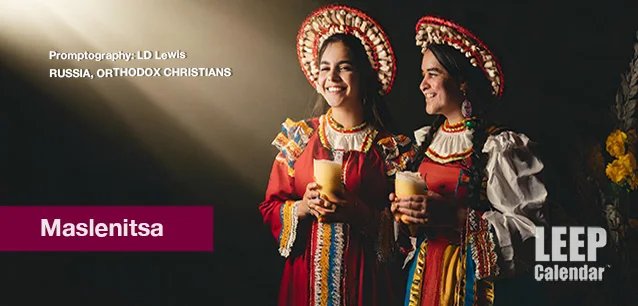 AD
AD
Today is: June 15
Scroll to explore events active on this date.
Additional Events on LEEP
LEEP INK FEATURES

May Blooms: Events in May 2025
Along with October, May is one of the most densely packed months of the year. It's before the summer humidity and the last whole month of the school year. The weather is warming in t...

Sweet June 2025
The solstice on the 20th marks the onset of summer (Northern Hemisphere) or winter (Southern Hemisphere). Many people, particularly in Europe, North America and Asia, will be embarking o...

Events in April 2025
Spring has sprung in the north, and the first hints of Autumn are on the horizon in the south. April is the month spring (or fall) gets underway, and it is filled with religious celebrations, including the Mu...
About Maslenitsa, Carnival in Christian Orthodox Countries
Food , Festivals & Fairs
Eastern Europe , Russia
Ends: Mar 17, 2024
DESCRIPTION:
Maslenitsa, also known as Pancake Week, is the Christian Orthodox faith's version of Carnival in the days leading up to the Lenten Fast in Russian and Slavic countries. This celebration has roots in both pagan and Christian traditions and is characterized by folk rituals, performances, games, and, most notably, the making and eating of pancakes.
Maslenitsa evolved from pagan rituals honoring the Slavic deity Veles, the patron of cattle and farming. The celebration symbolized the end of winter, the anticipation of spring, fertility, new life, and a struggle between the passing winter and the coming spring. This struggle is represented through various competitive games and activities.
CELEBRATING MASLENITSA
One of the most symbolic aspects of Maslenitsa is the preparation and consumption of blini (Russian pancakes). These pancakes are significant because their round, warm, golden appearance symbolizes the sun. Russian pancakes feature different toppings, including caviar, mushrooms, jam, or sour cream. In vintage Russian culture, blini represents the sun and the cycle of birth and death.
The week-long celebration of Maslenitsa involves different activities each day. For instance, Monday welcomes Maslenitsa by making a straw figure representing winter; Tuesday involves games and performances, and Wednesday opens feasts with blini and other dishes. Thursday is known for revelry and fistfights, while Friday and Saturday are reserved for family gatherings and honoring in-laws. Sunday is Forgiveness Sunday, where people seek forgiveness to cleanse themselves before Lent.
WHY PANCAKES?
Pancakes are a symbol of pre-Lent festivities. In many cultures, the period leading up to Lenten fast in the Christian liturgical year. Celebrations include feasting on foods that the faithful will give up during Lent. Pancakes, rich in eggs, butter, and milk (traditionally restricted during Lent), are a fitting choice for this final indulgence.
In Western Christian traditions, particularly in the United Kingdom and Ireland, Shrove Tuesday (Pancake Tuesday) is celebrated by making and eating pancakes.
In 2002, Moscow reinvigorated the celebration of Maslenitsa with large festivals, attracting numerous visitors. The celebration includes public festivities like sledding, tug-of-war, and the burning of the Maslenitsa effigy, symbolizing the farewell to winter and the welcoming of spring. Today, Maslenitsa is a celebration of spring and a cultural event that showcases Russian traditions and customs.
VIDEOS
SUPPORTING DOCUMENTS
Currently, this event does not have supporting documents.
ADDITIONAL IMAGES
Currently, this event does not have supporting images.
Where would you like to go now?
 AD
AD


/footer-logo.svg)
